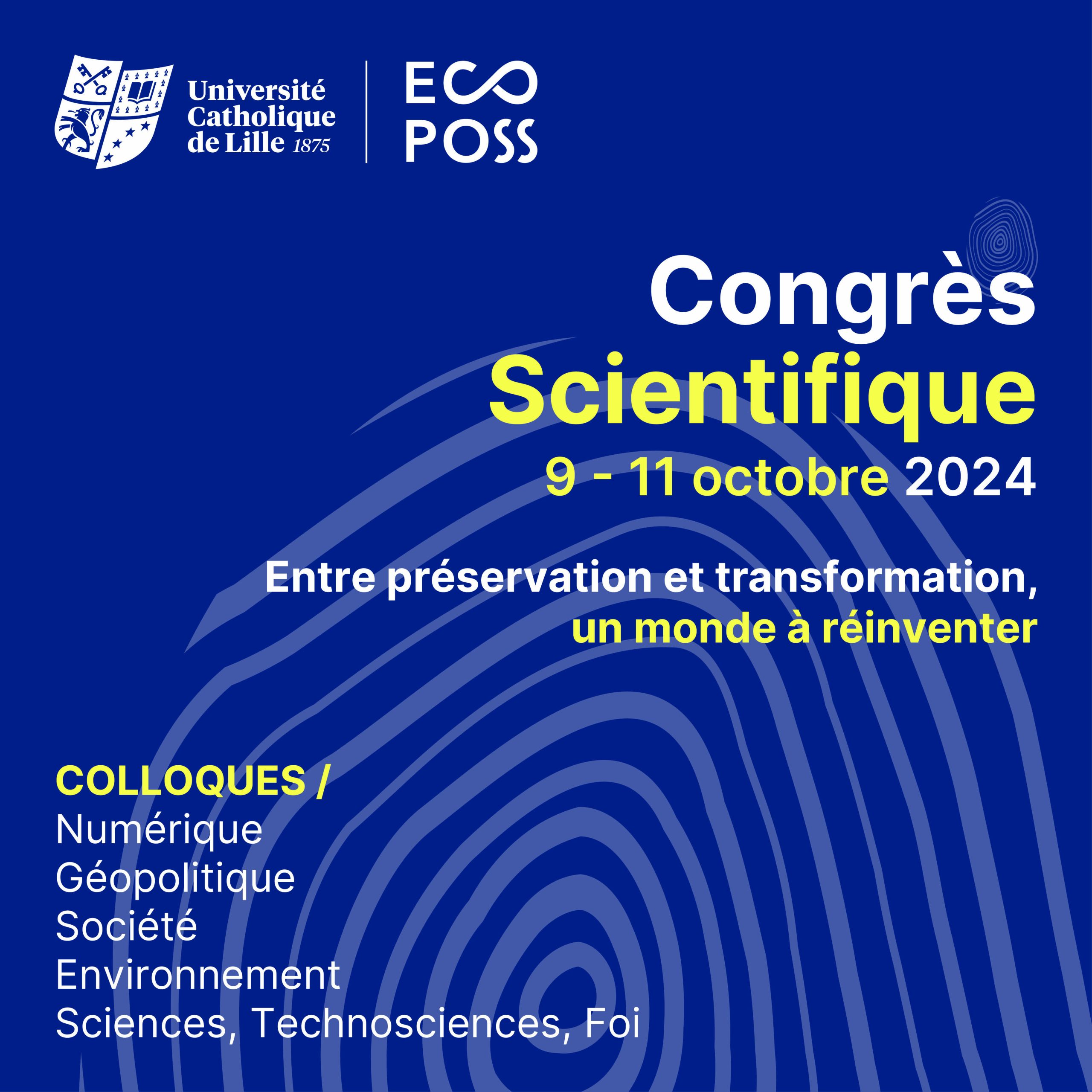
International conference.
9 – 11 october 2024
Languages of the conference: French and English, with simultaneous translation
Ce colloque bénéficie de la traduction simultanée anglais-français.
Τaking into account studies on science and theology since the 1980’s, the conference aim is to analyze in which ways the ecological urgency, which puts into question scientific progress, has an impact on science and theology questions today, in particular through the development of technosciences and related engineering since the beginning of the 21st century.
8:30 WELCOME SESSION
9:00-10:00 KEYNOTE
Philip CLAYTON, Institute for Ecological Civilization, Claremont (U.S.A.)
“Revisioning the relationship between the sciences and theology from the standpoint of integral ecology”
10:00-12:00 PARALLEL SESSIONS 30 min. each, including questions.
Michel RAQUET, UCLy, (FR.) “The completion of creation and the integral development of the human person”
Benoît ROBYNS, JUNIA, (FR.), “Smart Users for Energy & Societal Transition »
10:30 Break
Pavel GABOR, Vatican Observatory, Castelgandolfo (IT.) “The Book of Creation in Faith and in Science ”
Philippe DETERRE, Research Director Emeritus CNRS (FR.) “Revisiting Creation Theology”
Mathieu GUILLERMIN, UCLy, NHNAI project (FR.)
“What do we really mean when saying computers can or can’t do something? The (epistemological, and not only ethical) question of the place of lived experience.”
Dominique LAMBERT, Université de Namur (BE.) and Jacques PRINTZ, UCLille, (FR.)
“Inaccessible knowledge and limits of theorizing? Recognizing and accepting our limitations”
12:30-13:30 Lunch break
13:40-14:30 KEYNOTE
Denis ALEXANDER, Faraday Institute / Cambridge University (U.K.) “Genetics and theology”
14:30-17:00 PARALLEL SESSIONS 30 min. each, including questions.
Fabien REVOL, Centre Hélène et Jean Bastaire, (FR.) “The dignity of the human person from the standpoint of integral ecology and environment.”
Kathleen DUFFY, Emeritus, Chestnut Hill College (U.S.A.) “Teilhard’s Christic as Motivation for Earth’s Healing”
Stoyan TANEV, Carleton University, (CAN.) “The Adventures of the Digital: Quantum Computing »
Pierre GIORGINI, UCLille, (FR.) “AI and computer hyperpower at the heart of technoscientific convergence. A Christian looks at an unprecedented ethical challenge”
15:30-15:50 Break
Jean-Marc MOSCHETTA, ICT, (FR.) “Cosmic christology at the time of techno-sapiens, from Pierre Teilhard de Chardin to Ilia Delio”
Stefano BIANCU, LUMSA, (IT.) “«Humanus» means Benevolent. Rethinking the Human Specificity at the Time of AI. ”
17:30 Invitation to the solemn lecture of Lille Catholic University
Cocktail follows
9:00-10:00 KEYNOTE
Éric CHARMETANT, Facultés Loyola, Paris (FR.), “Digital technosciences and integral ecology”
10:00-10:20 PARALLEL SESSIONS 30 min. each, including questions.
Grégory AIMAR, journalist, (FR.) “Integral ecology and integrist technology: two visions, two pathways for the future”
Francis AGBOKOU, Doctoral student at ICP / SOFTE and research team of the Centre Hélène et Jean Bastaire, (FR./ Togo) “Teilhard de Chardin revisited by John Haught for a situated anthropology”
10:30-10:50 Break
Roland CAZALIS, Université de Namur (BE.) “A Scientific Paradigm for an Age of Integral Ecology.”
Patrick FARFAL, engineer and author (FR.) “How to progress toward an integral ecology with a simplistic social vision? Crossing Teilhard’s and Pope Francis’ contributions”
Dominique LAMBERT, Université de Namur (BE.) “Peace and technologies from the perspective of integral
ecology”
Brigitte CHOLVY, Emeritus ICP (FR.), Thierry MAGNIN, UCLille, (FR.) “The mediating effect of animal intelligence in the relationship of man to machine today”
Philippe GAGNON, UCLille, (FR.) “An anthropology from a process perspective?”
Guy-André LOEUILLE, Pediatrist (FR.) “Neuroplasticity and Teilhard de Chardin.”
12:20-13:30 Lunch break
13:30-14:30 KEYNOTE
Richard BAUCKHAM, University of St. Andrews, (U.K.) “Being Human in the Community of Creation: biblical approach”
14:30-17:00 PARALLEL SESSIONS 30 min. each, including questions.
Bernard MICHOLLET, Associate researcher UCLille (FR.) “Progress at the crossroads of integral ecology and theology of creation”
Emmanuel PIC, UCLille (FR.) “Work envisaged beyond a production factor: a determining factor for progress”
Thierry MAGNIN, UCLille, Vincent GREGOIRE-DELORY, ICT, (FR.) “The influence of the environment on the body-psyche-spirit in man”
Jean-Luc MARTIN-LAGARDETTE, Journalist and author, (FR.) “The absent soul or the mystery of the ‘stolen letter’?”
15:30-15:50 Break
Mercè PRATS, Associate researcher at the Laboratoire d’études sur les monothéismes (FR.) “The geologian Thomas Berry as reader of Teilhard de Chardin”
Axel SIEGEMUND, Institute für Katholische Theologie, RWTH (GER.) “Environmental and technological ethics: an irreconcilable encounter?”
Alejandro PEREZ, Centre Théologique de Meylan (FR.) “Marc Bellion, informational emergentism, and the intermediate state.”
Paulo RODRIGUES, UCLille, (FR.) “Neurosciences and religion: can entheogenic substances bring about ‘spiritual’ experiences?”
Evening : Gala
9:00-9:20 David DOAT, Franck DAMOUR, UCLille (FR.) and Jean-Marc MOSCHETTA “Anthology of humanistic figures crossing technics and religion”
09:30-12:20 PARALLEL SESSIONS 30 min. each, including questions.
Sébastien CARCELLE, UCLille, (FR.) “The Christian roots of agroecology in Brazil”
Franck DAMOUR, Associate researcher ETH+/ETHICS, UCLille, (FR.) “Breaking with the ‘technocratic paradigm’ through a ‘science of man’? Insights from Ivan Illich at the time of integral ecology.”
Benoit BOUREL, UCLille, (FR.) “Biodiversity: Intrinsic Value or management of goods and services?”
Marcel COMBY, Retired from l’Enseignement supérieur (FR.) “A convergence between ecumenical science and contemporary ecological science”
10:30-10:50 Break
Bernard JARRY-LACOMBE, CEF, (FR.) “AI, ethics, and Christian social thought”
Isabelle ROUSSEL, Emeritus, Université de Lille, (FR.) “Integral ecology revisits health”
Boleslav VRANY, Computer scientist, (CZ.) “Living our daily work as collaboration with God”
Isabelle PRIAULET, ICP et Centre Hélène et Jean BASTAIRE, (FR.) “The spiritual shift of collapsology”
Joseph Ntumba TSHIAMBI, Doctoral student, UCLouvain (BE.) “Supporting and accompanying ecoanxious persons: a challenge to the interreligious dialogue?”
Bruno DUFAY, Spiritual management coach, Centre Teilhard de Chardin (FR.) “An ecology of union”
12:30-13:05 ROUND TABLE
ABOUT INTEGRAL ECOLOGY DURING THE CONFERENCE Coordinator : François EUVÉ , Loyola Paris Faculties, (FR.)
Afternoon Visit of the city of Lille (optional, with registration)